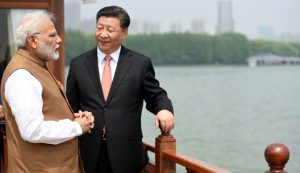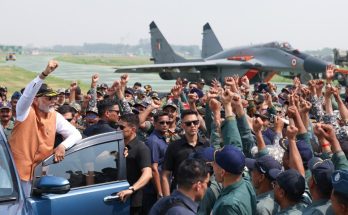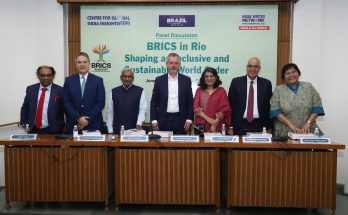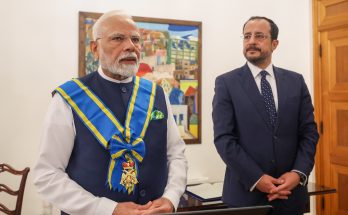
Four meetings between the leaders of India and China, spanning three continents in eight months! In a milestone that underscores the new normal and confidence in India-China relations, India’s Prime Minister Narendra Modi met Chinese President Xi Jinping for the fourth time this year in Argentine capital Buenos Aires, with both leaders agreeing that “2018 was a good year, but 2019 will be an even better year for India-China relations.”
The Modi-Xi chemistry shone anew at the Argentina capital as the two leaders warmly greeted each other before they sat down for talks with their respective delegations. A striking convergence of perspectives on the future trajectory of India-China relations marked their talks. The two leaders agreed that there has been “a perceptible improvement in bilateral ties” and “greater personal trust” since their landmark informal summit in the Chinese coastal city of Wuhan in April 2018. The fourth meeting between Mr Modi and Mr Xi – the previous three meetings took place in Wuhan, Qingado and Johannesburg – underscored “a new confidence and a new stability,” in India-China relations since the Wuhan consensus was forged between the two leaders.
“Enhanced trust, a new confidence”

The meeting in Buenos Aires on November 30 was primarily a trust-building exercise, aimed at reviewing the progress and mapping the way ahead for India-China relations. Providing a big-picture view, India’s Foreign Secretary Vijay Gokhale said on an upbeat note: “Both sides agreed that 2018 was a good year for India-China relations, but 2019 would be even better.” Summing up the essence of the talks, Mr Gokhale underlined the growing personal relationship between the two leaders, and said that there was a shared assessment that “strategic communication had been enhanced and trust had been built,” since the meeting in Wuhan.
The talks focused on joint efforts to further enhance mutual trust and friendship between the two Asian giants. Terming the Wuhan meet as a milestone in the India-China ties, Mr Modi told Mr Xi that he was looking forward to host him for an informal summit next year. “Such initiatives are helpful in maintaining the momentum,” the prime minister said. Alluding to the two review meetings — in Qingdao and in Johannesburg – Mr Modi underlined that the ties between the two countries have made huge strides over the last one year.
“Today’s meeting will be important in providing a direction in terms of strengthening our relations. “I express my heartiest thanks to you (President Xi) for taking out time for this meeting,” the prime minister said.
“Had a wonderful meeting with President Xi Jinping on the sidelines of the G-20 Summit in Argentina. The talks revolved around a wide range of bilateral and global subjects. Our regular interactions have added significant strength to India-China ties,” said Mr Modi in a tweet.
Bridging Trust Deficit

Apart from a big-picture review, the talks focused on recent steps to bridge the mammoth trade deficit between Asia’s number 1 and number 3 economies. “Both of them had a very detailed review of what they agreed to in Wuhan and how it was progressed. Both of them said that progress has been made on the economic side,” said Mr Gokhale.
Referring to steps taken by China in addressing trade deficit, Mr Xi referred to enhanced imports of rice and sugar from India and spoke about the possibility of greater import of soymeal and rapeseed. He also hoped that India would import more agricultural products from China.
In an important signalling, Mr Xi also indicated greater trade between the two nations in the pharmaceutical sector, a long-standing demand of India. Indian pharma companies have been pressing the Chinese side for years to open its huge market, with the Indian government consistently taking up the issue with the Chinese side.
Border Peace
Issues relating to maintaining peace and tranquillity in border areas also figured prominently in talks. “Both leaders (said) that there had been a positive improvement in border management along the India-China border areas following the Wuhan summit,” the foreign secretary said. In this regard, the leaders reviewed the recent talks between India’s National Security Adviser Ajit Doval and China’s State Councillor Wang Yi on boundary negotiations and agreed to prioritise confidence-building measures to maintain peace and tranquillity along the border.
People-to-People

Having stabilised their larger strategic relationship, which suffered severe train after the Doklam stand-off last year, India and China will now be focusing their attention on bolstering cultural and people-to-people contacts, the bedrock of any enduring partnership.

The launch of a new P2P mechanism, jointly by India’s External Affairs Minister Sushma Swaraj and Chinese Foreign Minister Wang Yi, in the third week of December in New Delhi will be a defining milestone and could impart more meaning and resonance to the oft-iterated cliché of the Elephant and the Dragon dancing together, their steps in harmony.
Author Profile

- Manish Chand is Founder-CEO and Editor-in-Chief of India Writes Network (www.indiawrites.org) and India and World, a pioneering magazine focused on international affairs. He is CEO/Director of TGII Media Private Limited, an India-based media, publishing, research and consultancy company.
Latest entries
 India and the WorldJune 16, 2025Amid Pakistan-Turkey nexus, Cyprus joins India against cross-border terror
India and the WorldJune 16, 2025Amid Pakistan-Turkey nexus, Cyprus joins India against cross-border terror India and the WorldMay 8, 2025Pahalgam payback: India exposes Pakistan’s lies, misuse of religious sites for training terrorists
India and the WorldMay 8, 2025Pahalgam payback: India exposes Pakistan’s lies, misuse of religious sites for training terrorists India and the WorldMay 3, 2025IMEEC provides a democratic alternative to BRI: Italy’s former foreign minister (Interview)
India and the WorldMay 3, 2025IMEEC provides a democratic alternative to BRI: Italy’s former foreign minister (Interview) India and the WorldApril 21, 20253T Template for India-US Mega Partnership
India and the WorldApril 21, 20253T Template for India-US Mega Partnership







